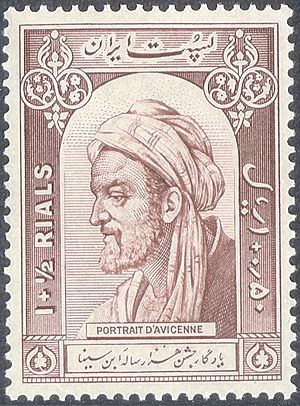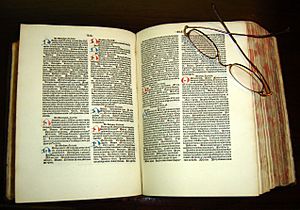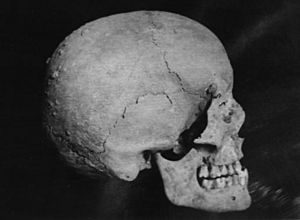Avicenna facts for kids
Quick facts for kids
Avicenna
Ibn Sina |
|
|---|---|
| ابن سینا | |

Portrait of Avicenna on an Iranian postage stamp
|
|
| Born | 980 Afshana, Transoxiana, Samanid Empire
|
| Died | 22 June 1037 (aged 56–57) Hamadan, Kakuyid dynasty
|
| Monuments | Avicenna Mausoleum |
| Other names |
|
|
Philosophy career |
|
|
Notable work
|
|
| Era | Islamic Golden Age |
| Region | Middle Eastern philosophy
|
| School | Aristotelianism, Avicennism |
|
Main interests
|
|
|
Influenced
|
|
Ibn Sina (Persian: ابن سینا; 980 – June 1037 CE), commonly known in the West as Avicenna (/ˌævɪˈsɛnə, ˌɑːvɪ-/), was a brilliant scholar who lived over a thousand years ago during a time called the Islamic Golden Age. He was like a superstar of learning, famous for being both a top doctor and a deep-thinking philosopher. People in the Western world often call him Avicenna, which is a Latin version of his Arabic name, Ibn Sina, meaning "Son of Sina." He wrote hundreds of books on all sorts of subjects, and his ideas were so important that they influenced thinkers and doctors for many, many centuries, both in the Muslim world and in Europe.
Contents
Early Life
Avicenna was born in a village called Afshana, near a big city called Bukhara, which is in a region that is now part of Uzbekistan. His family was Persian, and his father was a government official. Even as a young boy, Avicenna was incredibly smart and eager to learn. His father made sure he had the best teachers available.
By the time he was just ten years old, Avicenna had already memorized the entire Quran, the holy book of Islam. This shows how dedicated he was to learning from a very young age. He also learned arithmetic from an Indian grocer, showing that knowledge could come from unexpected places! He studied Islamic law and then began learning from a philosopher named al-Natili. Together, they studied important ancient texts.
Avicenna was such a fast learner that soon his teacher told him he could study on his own. By the age of eighteen, he was already incredibly knowledgeable in many subjects that came from the ancient Greeks, like geometry (the study of shapes and space) and astronomy (the study of stars and planets). He also learned medicine and became a practicing physician at a very young age.
Career
Avicenna's talents were quickly recognized. When he was just seventeen, he was asked to be the physician for the ruler of the region, Nuh II. This was a big responsibility for someone so young! Being a physician for rulers meant he had access to libraries and resources that most people didn't.
After his father passed away, Avicenna took on an administrative job for a while, possibly in the same area his father had worked. But his real passion was learning and writing. He traveled to different cities in Persia (which is now Iran) and Central Asia, seeking out places where learning was encouraged and where he could meet other scholars.
He lived and worked in places like Gurganj, Gorgan, Ray, Hamadan, and finally Isfahan. These cities were centers of culture and learning during the Islamic Golden Age. Avicenna often worked for the rulers of these cities, sometimes as a physician and sometimes even as a vizier, which was like a high-ranking advisor or minister in the government.
Working in different courts wasn't always easy. There were political changes and sometimes conflicts between rulers. Avicenna had to move several times because of these circumstances. At one point, he was even imprisoned for a few months, possibly because people suspected him of being in contact with a rival ruler. But even when things were difficult, he continued to study, think, and write. It's said that during his time in hiding or even in prison, he was still working on his major books!
He finally settled in Isfahan, where he was welcomed by the ruler Ala al-Dawla. This period was more stable for him, and he was able to focus on his work, serving as an advisor and accompanying the ruler on travels.
Philosophy and the Mind
Avicenna wasn't just a practical doctor; he was also a deep thinker about the big questions of life, the universe, and everything! He wrote extensively on philosophy, which is the study of fundamental questions about existence, knowledge, values, reason, mind, and language.
One of his most important contributions to philosophy was his thinking about existence. He distinguished between the essence of something (what it is) and its existence (that it is). He argued that for most things, their existence isn't a necessary part of what they are. For example, the essence of a chair is something you can sit on, but its existence depends on someone making it. But he argued there must be one being whose existence is its essence – something that must exist. He called this the "Necessary Existent" and identified it with God. This idea, known as the "Proof of the Truthful," was very influential in philosophy and theology for centuries.
Avicenna also had fascinating ideas about the human mind and soul. He believed the soul was something separate from the body, even though they are connected. He came up with a famous thought experiment called the "Floating Man." He asked people to imagine being created all at once, floating in the air, unable to see, hear, or feel anything, even their own body parts touching each other. He argued that even in this state, a person would still be aware of themselves existing. This, he said, showed that the soul (the self) is not dependent on the body or senses and is an immaterial substance. This idea was a very clever way to think about consciousness and the nature of the self.
He also thought about how we gain knowledge. He believed that our senses gather information from the world, but our intellect is needed to understand the universal ideas behind what we sense. He thought there was something called the "Active Intellect," which was like a divine light that helped our minds grasp these universal truths.
Writings
Avicenna was an incredibly productive writer. It's believed he wrote around 450 works, and about 240 of them still exist today! His books covered a huge range of topics, showing just how broad his knowledge was.
His two most famous works are:
- The Book of Healing (Kitab al-Shifa): This wasn't just a medical book. It was a massive encyclopedia covering philosophy, logic, physics, mathematics, and even music theory. It was a huge effort to organize and explain all the knowledge of his time, building on the ideas of ancient Greek philosophers like Aristotle.
- The Canon of Medicine (Al-Qanun fi'l-Tibb): This is the book that made him most famous in the world of medicine. It was a comprehensive medical encyclopedia that brought together knowledge from Greek, Roman, Persian, and Indian medical traditions, along with his own observations and experiences. It described diseases, symptoms, diagnoses, and treatments. This book was so important that it was translated into Latin and became the standard medical textbook in many European universities for hundreds of years, right up until the 17th century! Doctors in Europe relied on Avicenna's Canon to learn about medicine. It's still used today in some traditional forms of medicine, like Unani medicine.
Besides these major works, Avicenna wrote many other books and shorter writings on specific topics. He wrote about astronomy, criticizing some older ideas and even claiming to have observed the planet Venus passing in front of the sun (a transit). He wrote about the Earth sciences, explaining how mountains might be formed by earthquakes or erosion over long periods. He also wrote about logic, developing new ideas that influenced later thinkers.
Interestingly, while some people at the time were interested in alchemy (trying to turn metals into gold), Avicenna was quite skeptical. He wrote that chemists could make things look like they changed from one substance to another, but they couldn't truly change the fundamental nature of substances.
Avicenna wrote most of his scholarly works in Arabic, which was the common language of science and learning in the Muslim world at the time. But he also wrote some important works in Persian, his native language, including a philosophical book called the Danishnama ("Book of Knowledge"). He even wrote poetry in both languages.
Legacy
Avicenna's impact on the world of learning was enormous and long-lasting. In the Islamic world, his philosophical and medical works were studied, debated, and built upon by countless scholars for centuries. His ideas became a core part of the curriculum in many schools.
In Europe, after his works were translated into Latin starting in the 12th century, Avicenna became a towering figure. European scholars and doctors eagerly studied his Canon of Medicine and his philosophical works. He was considered one of the greatest authorities alongside ancient figures like Hippocrates and Galen in medicine, and Aristotle in philosophy. His ideas influenced major European thinkers like Thomas Aquinas.
Today, over a thousand years after his birth, Avicenna is still recognized as one of the most important figures in the history of science and philosophy. Universities, hospitals, and research institutes in many countries are named after him to honor his contributions. UNESCO, the United Nations organization for education, science, and culture, even has an "Avicenna Prize" for ethics in science, highlighting his legacy as a thinker who considered important questions about knowledge and life.
His story reminds us of the incredible intellectual achievements of the Islamic Golden Age and how the exchange of ideas across different cultures has shaped the world we live in today. Avicenna was a true giant of learning, whose curiosity and dedication helped advance human knowledge in countless ways.
Avicenna quotes
- "There are no incurable diseases — only the lack of will. There are no worthless herbs — only the lack of knowledge."
- "The more brilliant the lightning, the quicker it disappears."
- "Width of life is more important than length of life."
Images for kids
-
Map of Khurasan and Transoxiana
-
Coin of Ala al-Dawla Muhammad (r. 1008 – 1041), the Kakuyid ruler of Isfahan
See also
 In Spanish: Avicena para niños
In Spanish: Avicena para niños
- Al-Qumri (possibly Avicenna's teacher)
- Abdol Hamid Khosro Shahi (Iranian theologian)
- Mummia (Persian medicine)
- Eastern philosophy
- Iranian philosophy
- Islamic philosophy
- Contemporary Islamic philosophy
- Science in the medieval Islamic world
- List of scientists in medieval Islamic world
- Sufi philosophy
- Science and technology in Iran
- Ancient Iranian medicine
- List of pre-modern Iranian scientists and scholars
Namesakes of Ibn Sina
- Ibn Sina Academy of Medieval Medicine and Sciences in Aligarh
- Avicenna Bay in Antarctica
- Avicenna (crater) on the far side of the Moon
- Avicenna Cultural and Scientific Foundation
- Avicenne Hospital in Paris, France
- Avicenna International College in Budapest, Hungary
- Avicenna Mausoleum (complex dedicated to Avicenna) in Hamadan, Iran
- Avicenna Research Institute in Tehran, Iran
- Avicenna Tajik State Medical University in Dushanbe, Tajikistan
- Bu-Ali Sina University in Hamedan, Iran
- Ibn Sina Peak – named after the Scientist, on the Kyrgyzstan–Tajikistan border
- Ibn Sina Foundation in Houston, Texas
- Ibn Sina Hospital, Baghdad, Iraq
- Ibn Sina Hospital, Istanbul, Turkey
- Ibn Sina Medical College Hospital, Dhaka, Bangladesh
- Ibn Sina University Hospital of Rabat-Salé at Mohammed V University in Rabat, Morocco
- Ibne Sina Hospital, Multan, Punjab, Pakistan
- International Ibn Sina Clinic, Dushanbe, Tajikistan






